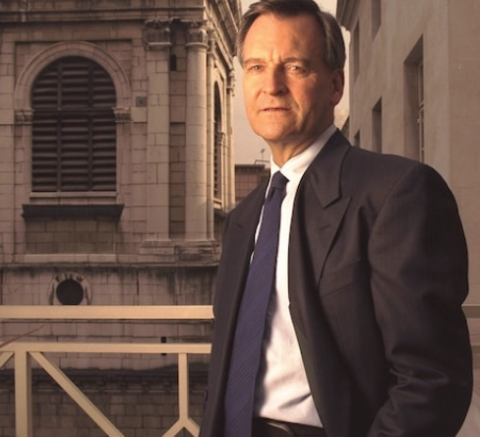Sir Christopher Hogg, who has died aged 85, was one of the most principled and disciplined British business leaders of his generation, as chairman first of Courtaulds and later of Reuters, GlaxoSmithKline and Allied-Domecq. he conducted his National Service with 3 Para at the time of the Suez Crisis.
Hogg was just 43 when he was promoted to be executive chairman of Courtaulds at the end of 1979. Having expanded in the 1960s into a sprawling conglomerate of textile, artificial fibre and chemical interests, the group had already embarked on painful restructuring – which Hogg accelerated, focusing intensely on parts of the business which he felt had a chance of resisting low-cost competition from Asia and elsewhere.
Hogg’s management style was based on thinking deeply and objectively about any given problem until he saw a solution – which he would then drive forward regardless of short-term stock-market or media opinion. Such steeliness of mind proved to be “both a blessing and a curse”, as one observer put it, attracting flurries of criticism amid a broader stream of admiration and praise.
Perhaps the boldest strategic decision of Hogg’s career, in 1985, was the hiving off of Courtaulds Textiles into a separate subsidiary which he floated on the stock exchange four years later. The demerger recognised that fashion-conscious clothing businesses required quite different management skills from the industrial interests – fibre, paints and packaging materials – that remained in the original Courtaulds company.
To run the textile side, Hogg recruited the Financial Times journalist Martin Taylor, later chief executive of Barclays and a disciple who credited Hogg with showing him how to find “the right balance between patience and impatience” in decision-making.
Hogg remained chairman of the textile business – which emerged as the stronger performer of the two – until 1995, and of the industrial Courtaulds until 1996. The latter was in due course acquired by the Dutch chemical group Akzo Nobel.
Meanwhile, since 1985 he had also been chairman of Reuters – where his long tenure, until 2004, would bestride a period in which the historic news agency established itself as the dominant provider of screen-based financial information for City trading-floors of the Big Bang era, but then gradually lost ground to new competitors such as Bloomberg, eventually falling into losses .
Having stayed on to support a new chief executive – Tom Glocer, who took the helm in 2000 – Hogg defended Glocer’s pay package despite a fall in Reuters’ share price and the necessity for major job cuts.
Christopher Anthony Hogg was born in Surrey on August 2 1936, the son of Anthony Hogg, a publisher, and his wife Monica, née Gladwell – and grandson of an Edwardian playwright, Cyril Wentworth Hogg.
Christopher was educated at Marlborough College. After National Service in the Parachute Regiment he went up to Trinity College, Oxford, to read English, switching to business studies at Harvard as a Harkness scholar and at the Imede school in Lausanne before joining Philip Hill, Higginson, Erlanger’s, a City merchant bank which became, by merger, Hill Samuel.
In 1966 he left to join the Industrial Reorganisation Corporation, the interventionist agency established by Harold Wilson’s government under the leadership of the formidable Courtaulds chairman Sir Frank (later Lord) Kearton. IRC’s mandate was to make British industry more competitive by identifying and driving corporate mergers that might create national champions; in its hothouse of talent, the young Hogg’s analytical skills stood out.
When Kearton returned full-time to Courtaulds in 1968, he swiftly recruited Hogg, who made a first success of running the group’s paint interests. When it became clear in the depressed conditions of the later 1970s that the stumbling giant created by Kearton was in need of radical surgery, Kearton’s successor Sir Arthur Knight put Hogg in charge of its clothing and textile businesses, for which one of his urgent tasks was to repair strained relations with Marks & Spencer as Courtaulds’ biggest customer. Knight in due course favoured Hogg over other internal candidates to follow him into the chair.
Hogg was knighted in 1985 and received the gold medal of the British Institute of Management the following year. He was a member of the Court of the Bank of England from 1992 to 1996; chairman of the drinks conglomerate Allied-Domecq from 1996 to 2002; of the National Theatre from 1995 to 2004; and of the Financial Reporting Council from 2006-10.
As competitive as he was cerebral, Hogg was accustomed to winning an annual “neighbours’ 100-yard sprint” in communal gardens adjoining his Notting Hill home. When a newcomer beat him, he quizzed the victor closely on his fitness regime and never entered the race again.
Christopher Hogg married first, in 1961, Anne Cathie; the marriage was dissolved in 1997, and he married secondly, in that year, the health writer and broadcaster Miriam Stoppard. She survives him with two daughters of the first marriage.
Sir Christopher Hogg, born August 2 1936, died December 7 2021
In Dr Sandy Cavanagh's book Airborne to Suez (Sandy was RMO 3 PARA and later a GP in Brecon) he describes Chris Hogg
as 'a serious minded 19 year old who took the complex task of managing his platoon in deadly earnest’
Created with information and image kindly supplied by H MacGregor of Airborne Network.
Read More

Latest Comments
There are currently no comments for this content.
Add Comment
In order to add comments you must be registered with ParaData.
If you are currently a ParaData member please login.
If you are not currently a ParaData member but wish to get involved please register.